Year in Review 2023
In 2023, UNBC students cultivated their curiosity, researchers fostered local solutions for global impact, alumni empowered northern communities and the University community took action on Truth and Reconciliation.

We look back at some of the most memorable moments from the past year.
January
UNBC joins with the Caledonia Nordic Ski Club to offer an exceptional experience to cross-country ski athletes coming to Prince George to compete in the Nordiq Canada Selection Trials and Nordiq Cup. All participating athletes are eligible for a UNBC tuition credit – a first in Nordiq Canada event history!
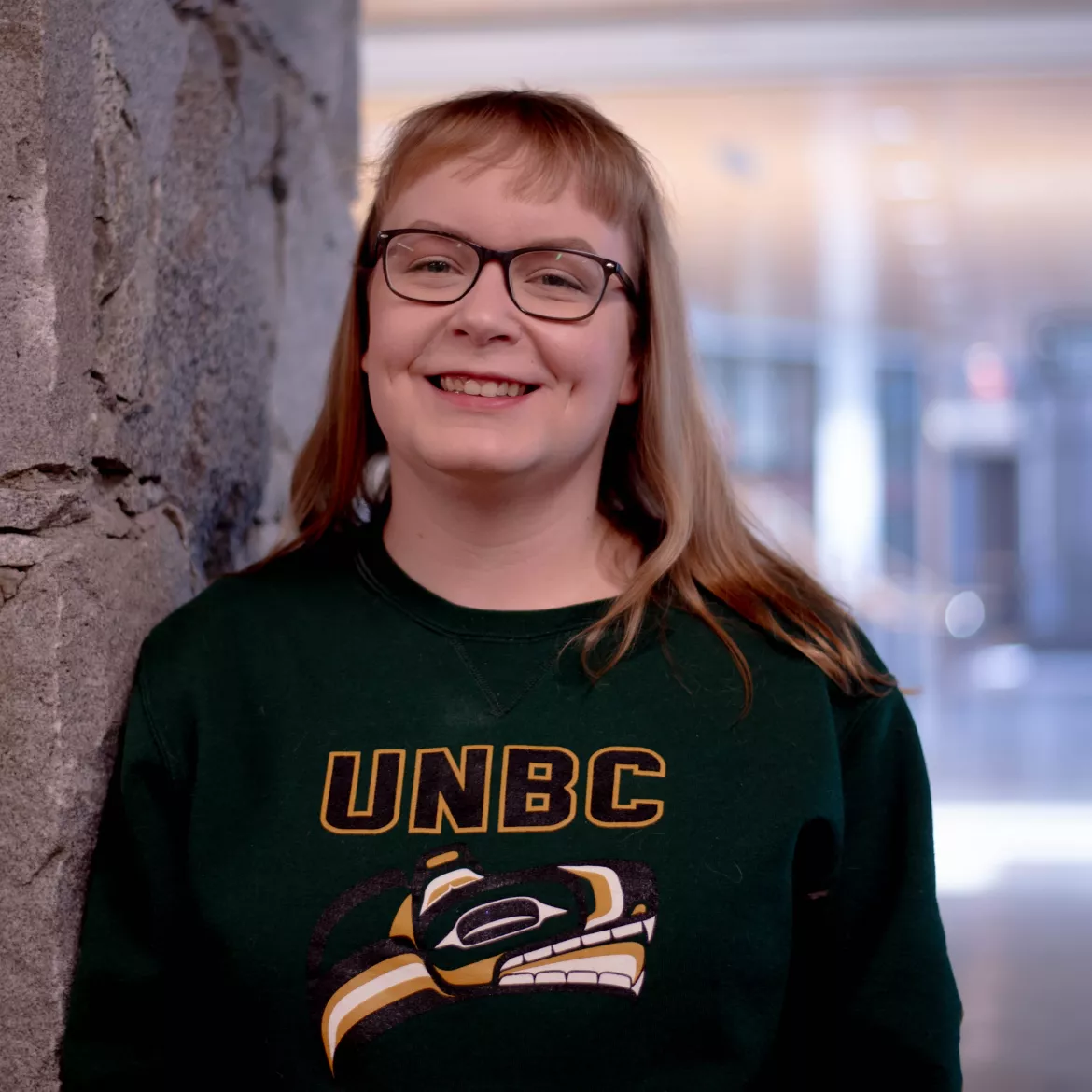
UNBC increases its research funding for the third year in a row according to the latest edition of the Canada’s Top 50 Research Universities report, produced by Research Infosource. UNBC’s total research income rises to $15.2 million, a 9.1 per cent increase from the previous year and the largest overall total since 2010. UNBC places in the top 10 among universities in its tier in categories related to research intensity and research income from not-for-profit sources.
Fourth-year Computer Science student Elizabeth Norman (pictured) receives an Instructor Recognition Award from Actua, a national organization committed to fostering science, technology, engineering and math education for youth six to 26, for her work with young people in northern B.C. through UNBC's Active Minds program.
February
First Nations Studies student Sarah Dixon receives a Skills Award for Indigenous Youth from the Forest Products Association of Canada and the Canadian Council of Forest Ministers, recognizing her contributions as a mentor to other Indigenous youth interested in natural resource industries and her commitment to a sustainable future.
The Northern Baccalaureate Nursing Program at UNBC expands with a new location in Prince George that starts in September 2023. The new two-year nursing degree program provides more healthcare education opportunities in the North and help improve access to care for patients across the region. It’s housed in newly renovated classroom and lab space at the Wood Innovation and Design Centre in downtown Prince George.
Nursing Associate Professor Dr. Sheila Blackstock and First Nations Studies Associate Professor Dr. Daniel Sims are the new Academic Co-Leads with the National Collaborating Centre for Indigenous Health. Sims and Blackstock are committed to continuing to build on NCCIH’s decolonizing approach to advancing Indigenous public health and knowledge translation and exchange. Founding Academic Lead Dr. Margo Greenwood left the position after being appointed to the Senate of Canada.
March
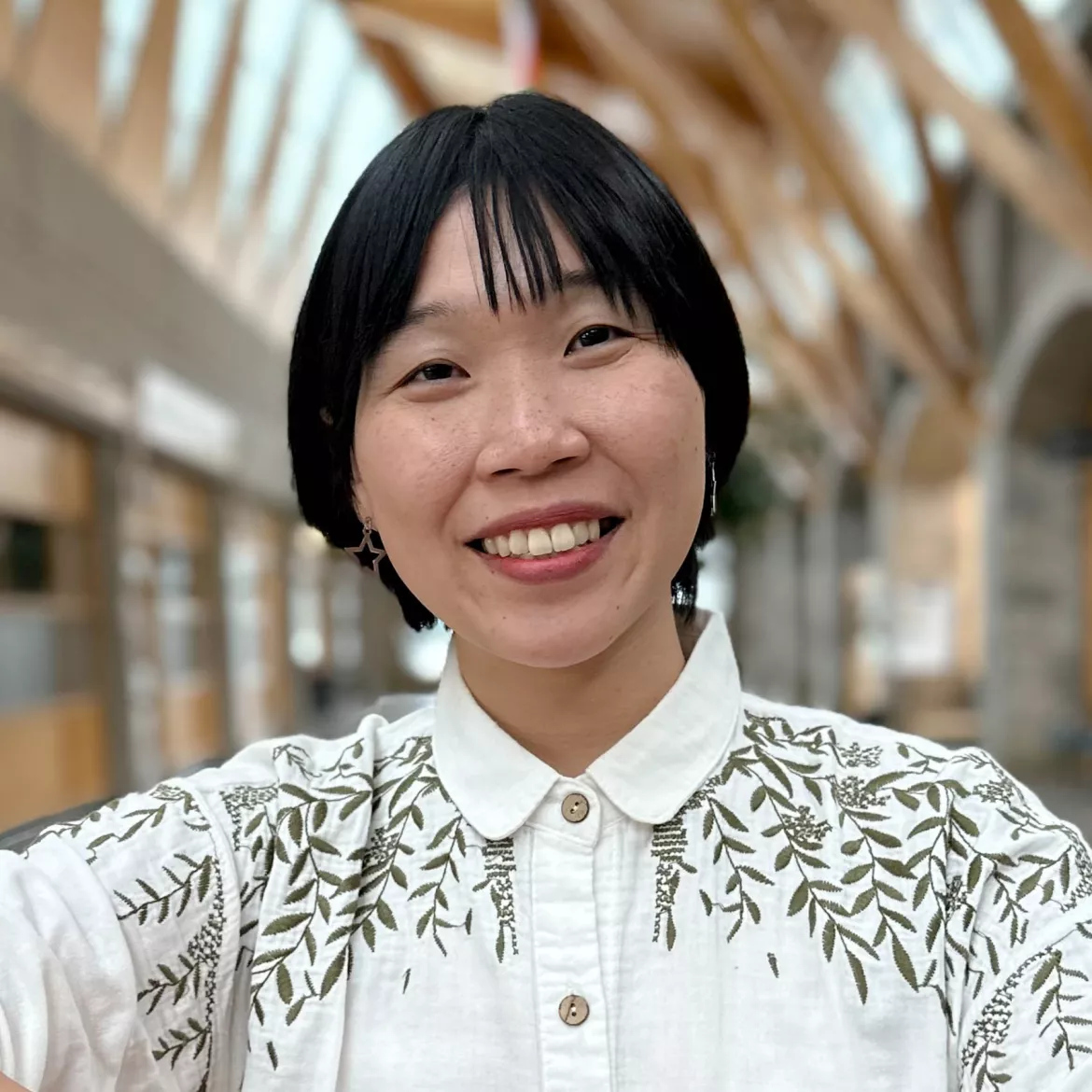
Natural Resources and Environmental Studies PhD candidate Sunny Tseng (pictured) earns top prize at UNBC’s Three Minute Thesis event and goes on to represent the University at the Western Regional Competition in May. Her research focuses on using passive acoustics as a tool to monitor Barred Owls.
UNBC is one of seven new university members of TRIUMF, Canada's particle accelerator centre. UNBC researchers have been working on projects at the facility since 1993. Currently, UNBC is involved in a project that aims to build the world’s most advanced ultra-cold-neutron facility to carry out the world’s most precise measurement of the neutron electric dipole moment.
April
For the first time, a UNBC research is named a United Nations Educational, Scientific and Cultural Organization Chair. Global and International Studies Associate Professor Dr. Agnieszka Pawlowska-Mainville and Heritage Saskatchewan Director of Living Heritage Kristin Catherwood are the new UNESCO Co-Chairs in Living Heritage and Sustainable Livelihoods.
The Northern BC Climate Action Network holds its first in-person meeting at UNBC. The network, which launched in 2022, aims to identify and celebrate opportunities for climate action that work for northern B.C., encourage regional innovation and identify funding opportunities.
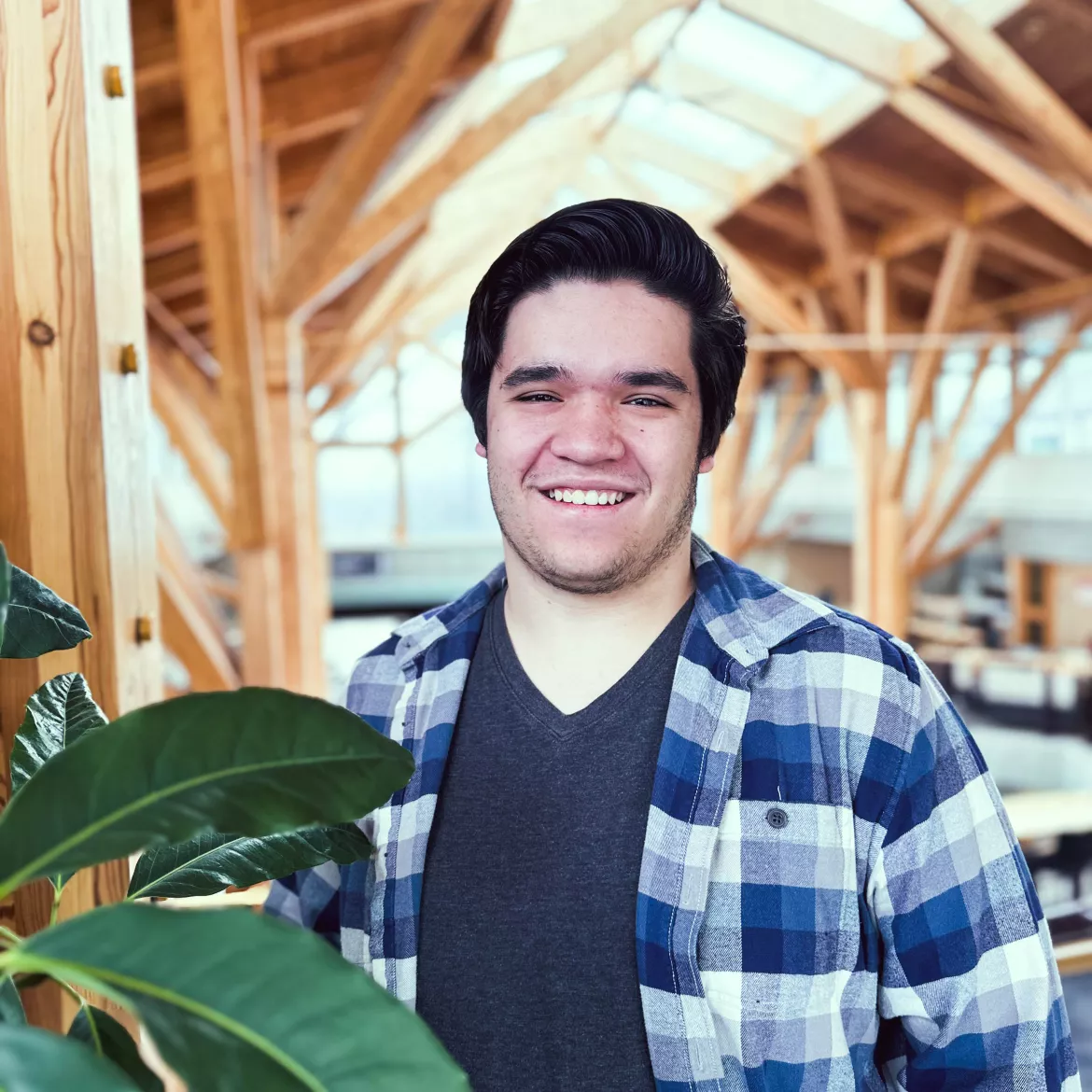
UNBC announces the two honorary degree recipients for 2023: Garry Gottfriedson, a Secwépemc knowledge holder and cultural leader who is committed to lending his knowledge in both land-based teaching and creative writing; and Selen Alpay, an established Prince George business owner, community leader and philanthropist.
Bachelor of Arts in History student Sean Robinson (pictured) wins the Canadian Society of Patristic Studies national student essay prize for his paper centred on the early Christian, Ignatius of Antioch.
May
Two outstanding members of the Class of 2023 deliver valedictory addresses at Convocation celebrations at the Prince George campus. Master of Business Administration graduate Reuben Mann and Master of Social Work graduate Furqana Khan share their experiences with their fellow graduates.
The second largest graduating class in UNBC history celebrates with friends and family at the Prince George Convocation. Among the 843 credentials awarded during the two ceremonies are the first Bachelor of Applied Science in Engineering from UNBC’s Civil and Environmental Engineering programs. In addition, the two undergraduate engineering programs receive maximum accreditation from the Canadian Engineering Accreditation board.
June
UNBC graduates from across northern B.C. celebrate the completion of their programs. In Terrace and Quesnel, the first graduates from the renewed Bachelor of Education program receive their degrees. In Fort St. John, the first graduates from the Bachelor of Science in Nursing cross the stage. In Gitwinksihlkw, Julia Adams, the first matriarch to graduate with a master’s degree at the Wilp Wilxo’oskwhl Nisga’a Institute, receives her credential.
Joel McKay, a well-known advocate for northern British Columbia, begins his term at Chair of the UNBC Board of Governors. McKay is the CEO of the Northern Development Initiative Trust, an independent non-profit corporation that stimulates economic growth through investments in grassroots, community-led projects. He is also a former journalist, author and graduate student at UNBC, studying English literature.
July
Dr. Paula Wood-Adams becomes UNBC’s new Vice President Research and Innovation. An engineer with a remarkable 25-year academic career, joins UNBC from Concordia University. In her new role, Wood-Adams will be supporting faculty members in developing outstanding research programs in all disciplines working to enhance partnerships with government and industry collaborators.
Geography, Earth and Environmental Sciences Associate Professor Dr. Joseph Shea receives $180,000 over three years from the Pacific Institute for Climate Solutions to lead a research project aimed at helping mountain communities better prepare for geohazards like rockfalls and landslides resulting from changing snowpacks and climate change.
An interactive online map developed by UNBC researchers in collaboration with Environment and Climate Change Canada (ECCC) is making it easier for Canadians to monitor air quality in their community. UNBC graduate Brayden Nilson played a crucial role in developing the map during his time as a student and research associate with Faculty of Environment Professor Dr. Peter Jackson. Nilson now works for ECCC.
August
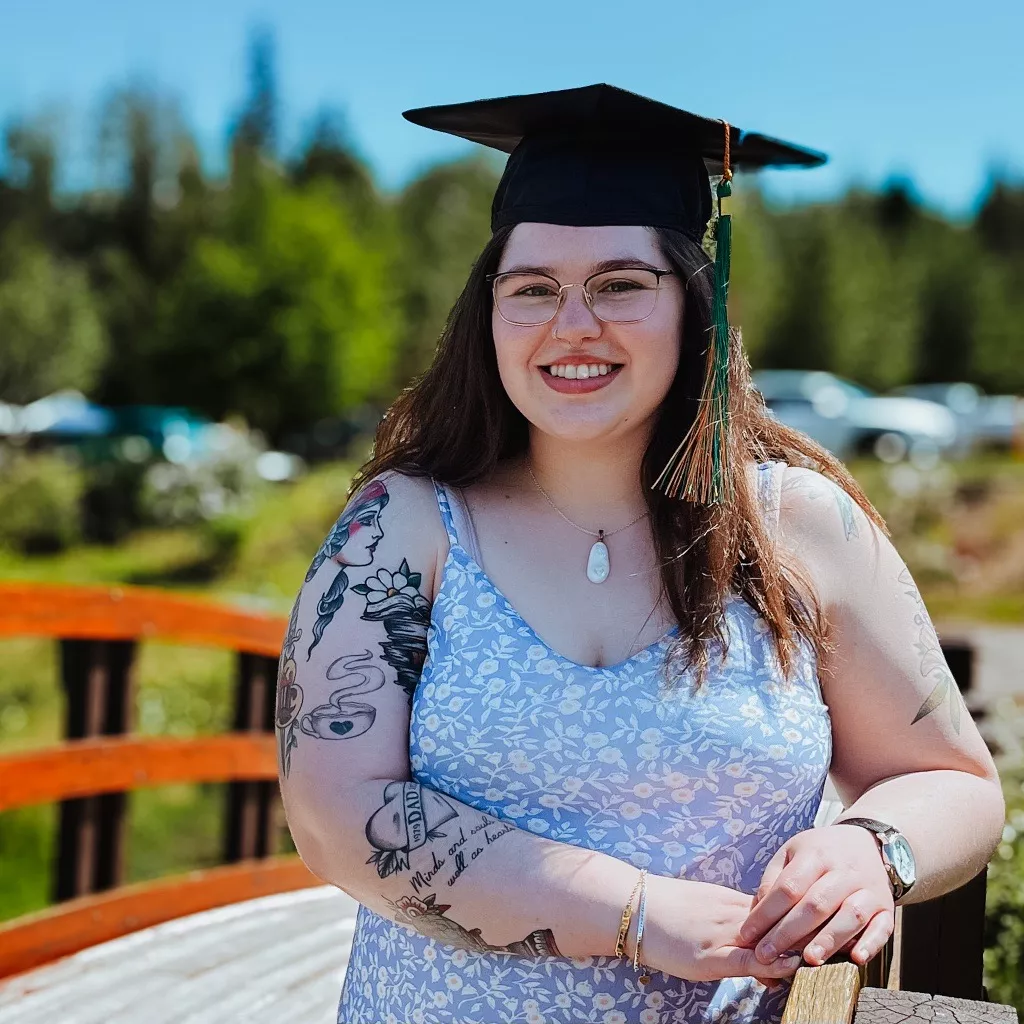
Recent Bachelor of Arts in History graduate Rebecca Campbell (pictured)wins the W. Kay Lamb Award from the B.C. Historical Federation. Campbell’s award-winning paper examined the impact women had on history making in B.C. between 1950 and 1970.
Bachelor of Planning undergraduate student Matt Henderson spends the summer engaging with communities in the North Cariboo region to identify potential policies to support the farming and ranching industries. With summer drought conditions underscoring the precarity of the industries, Henderson is leading a project to source long-term, locally focused solutions.
A group of researchers from UNBC secures $800,000 in funding to embark on the third phase of an interdisciplinary research project exploring critical issues surrounding the Nechako River Basin. The Integrated Watershed Research Group’s overarching goal is to enhance readiness for comprehensive responses to the dynamic relationships between climate, water and communities within the basin.
September
Vice-President Academic and Provost Dr. Wendy Rodgers is announced as chair of the new Council of Canadian Academies expert panel. The panel is tasked with assessing the best practices for equity, diversity and inclusion in the research ecosystem.
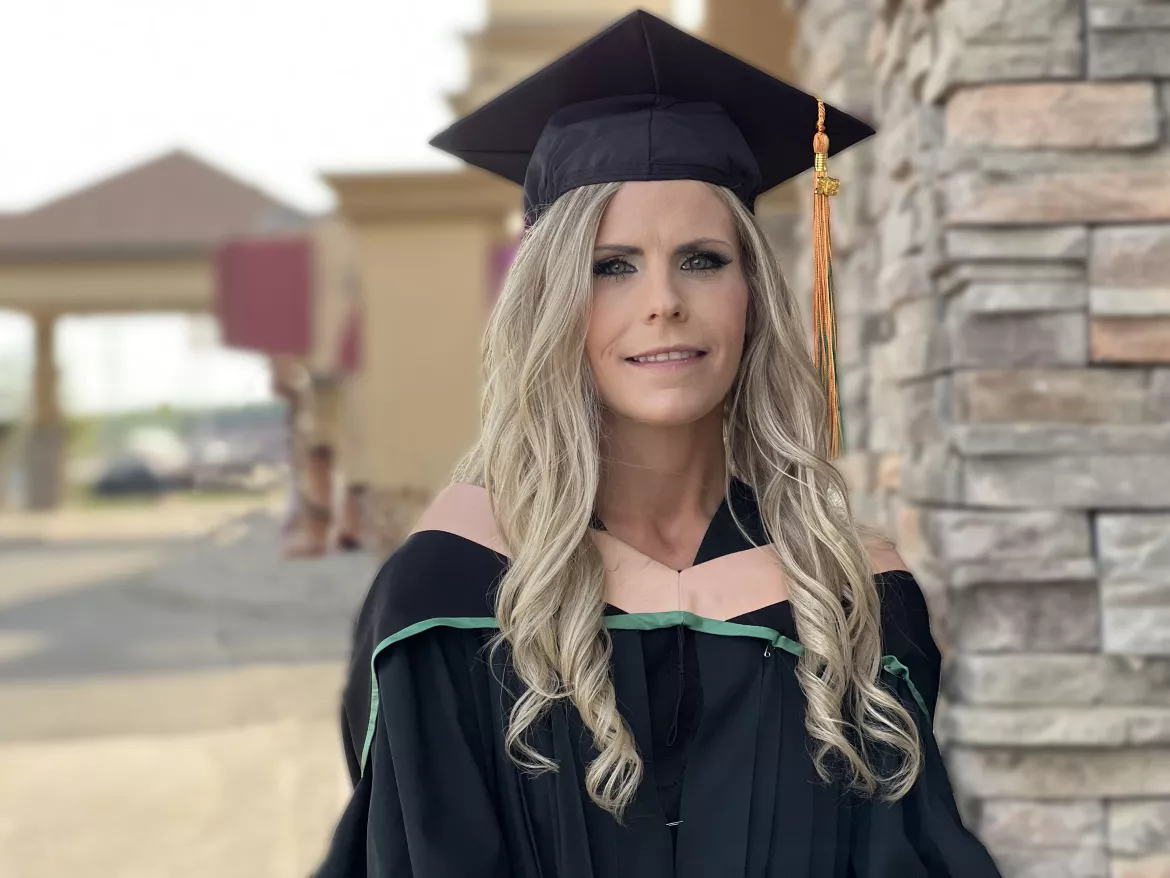
After being among the first cohort to graduate from the School of Nursing’s Northern Baccalaureate Nursing Program at UNBC’s Peace River-Liard campus in June, life has been a whirlwind for newly Registered Nurse Lexine Giroux. Giroux (pictured) completed additional training over the summer to move into a position as a Cancer Care-Oncology nurse in her home community of Fort St. John.
A lifelong learner, Dr. Elsie Gerdes was one of the University’s Founders. A memorial tea was held in her honour in the Founders Lounge at the Prince George campus in the summer to commemorate her passing in 2021. Her legacy will live on with the creation of the Elsie and Dieter Gerdes Scholarship.
October
We’re Ready! “We’re ready to make our mark with this framework for the future,” says UNBC President Dr. Geoff Payne in unveiling the University’s new strategic plan. Informed by UNBC’s new vision, Leading a Sustainable Future, the plan identifies key actions that will allow UNBC to reach its targets through education, research and community engagement. Watch the Ready launch video.
UNBC places second in the annual Maclean’s magazine university rankings. It is the 20th consecutive year UNBC has placed in the top five in the Primarily Undergraduate group.
November
With support from the Province of British Columbia, the Master of Science in Nursing: Family Nurse Practitioner Program doubles in size from 20 to 40 seats. The increase provides more opportunities for nurses interested in pursuing advanced education in northern B.C.
Engineering Professor Dr. Jianbing Li’s groundbreaking research to advance the science of marine oil spill response and environmental protection will enter its next phase thanks to renewed funding from the Government of Canada’s Multi-Partner Research Initiative through the Ocean Protection Plan.
When the quest for so-called civic respectability in the early settlement days of what is now Prince George clashed with the reality in the townsites, a reputation was born. History Professor Dr. Jonathan Swainger examines this dichotomy in his new book The Notorious Georges: Crime and Community in British Columbia’s Northern Interior, 1909-25.
December
UNBC’s research income increased for the fourth straight year in the latest Canada’s Top 50 Research Universities rankings produced by Research Infosource Inc. The University earned $17.7 million in research income in the 2022 fiscal year, marking the second highest total earnings in UNBC’s history.
Natural Resources and Environmental Studies PhD student Annika Putt was drawn to UNBC by the opportunity to work on a unique collaborative fisheries research project. To assist in her research supporting the conservation and recovery of the eulachon fishery population, Putt has been awarded a prestigious Vanier Canada Graduate Scholarship valued at $50,000 per year for the next three years.
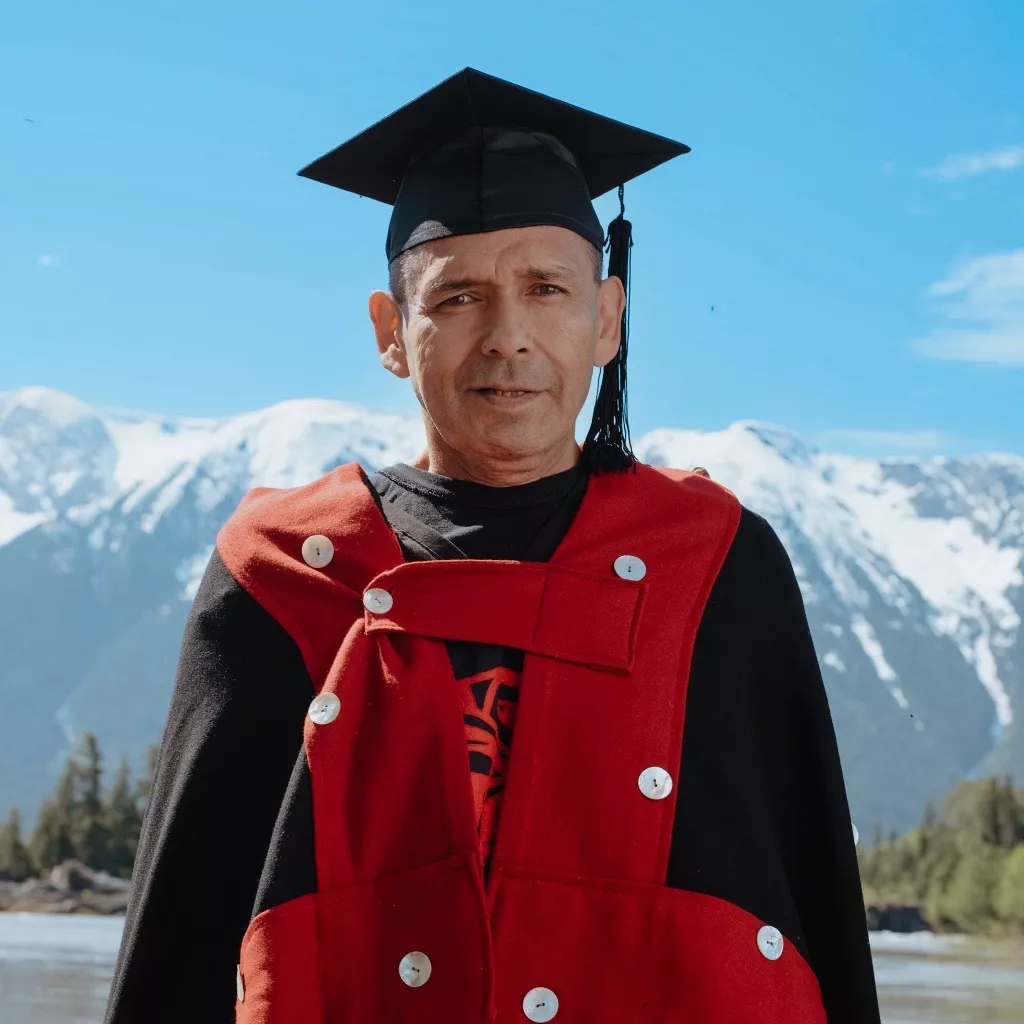
The Wilp Wilxo’oskwhl Nisga’a Institute and UNBC are helping to ensure the long-term vitality of the Nisga’a language through the creation of the new Bachelor of Arts in Nisga’a Language Fluency degree set to launch in September 2024.
Christopher Morven (pictured) completed the existing certificate in Nisga'a Language and is on the road to becoming a fluent speaker. He says this new program will provide more students with the chance to re-connect with their language.
The new four-year undergraduate degree is the first of its kind in northern B.C. and will offer students an immersive education in the Nisga’a language with about 70 per cent of the courses having a Nisga’a language component.